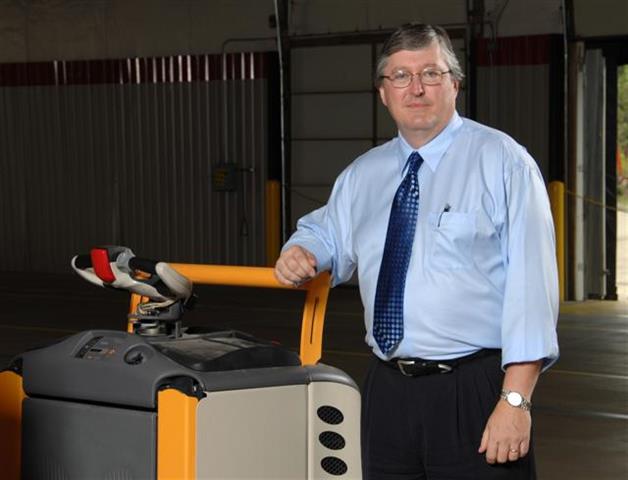 Eric Jensen |
Crown Equipment Corp is describing its fuel cell qualification program for electric forklifts as "the first of its kind within the forklift industry".
"We want to keep this (subject) in front of our customers," says Eric Jensen, Crown manager of new technology research and development. Crown wants to qualify its forklifts for fuel cell use, "and we want our customers to trial them".
Crown began formulating the qualification program in 2007 in anticipation of a request for proposal from the fuel cell program of the technology-oriented Ohio Third Frontier Commission under the state's department of development. For the fuel cell work with forklifts, state entities awarded grants to Crown for USD997,000 in March 2008 and a Crown-led consortium received USD1 million in April 2009
(Forkliftaction.com News #409). In each case, a provision requires recipients to invest "at least 50 cents on the dollar" in cost-sharing aspects, he notes.
Jensen says, "We have had a lot of experience in the last year and a half working with fuel cell vendors" including Oorja Protonics Inc of Fremont, California; Plug Power Inc of Latham, New York; Nuvera Fuel Cells Inc of Billerica, Massachusetts and Milan, Italy; and Hydrogenics Corp of Mississauga, Ontario, Canada.
In addition, Crown has worked with technologies from Proton Motor Fuel Cell GmbH of Puchheim, Germany; Infintium Energy Inc. of Carrollton, Texas; and Ballard Power Systems Inc of Burnaby, British Columbia, Canada.
As part of its fuel cell effort, Crown established a project centre in a 25,000 sqft (2,250 sqm) building in Huber Heights, Ohio in 2008. The location is in close proximity to project collaborators including the Edison Materials Technology Centre, in Dayton, Ohio; NexTech Materials Ltd, of Lewis Centre, Ohio; a Sidney, Ohio site of Plug Power; and the TJ Smull College of Engineering at Ohio Northern University, in Ada, Ohio.
Crown engineers gauge performance metrics for a battery-powered truck such as traction, plugging, and lift and travel speeds. After replacing the battery with the fuel cell power pack, they measure the same indicators. Modeling and application testing enable the research team to determine changes to allow the fuel cell-powered forklift to match specifications for which the truck was initially designed.
With the qualification program, "Crown is taking on a responsibility for our customers' use of machines for something" previously not conceived, Jensen notes. Crown forklifts in the past were "designed for lead-acid batteries. Fuel cells are different."
Ballast weight is often an issue. A fuel cell installer may add some weight, but "sometimes the location is not in centre and may influence balance", Jensen says.
Further, a typical fuel cell may supply sustained power that will make a forklift go too fast. "We have to take steps to prevent a truck from exceeding the designed speed," he notes. "We do transient testing so voltage spikes do not cause confusion in the truck."
The Crown program goes into action upon receiving a branch or dealer request for modification of a customer's forklift.
"We review the official document internally so the machine will remain in compliance," he says. "If Crown has previously tested the forklift-fuel cell combination, "we will issue an addition-to-capacity tag that it is okay to use this fuel cell in this truck."
Crown tries to stay ahead of requests for forklift-fuel cell combinations yet to be tested. Branch or dealer technicians with input from New Bremen-based Crown have the competency to make the modifications.